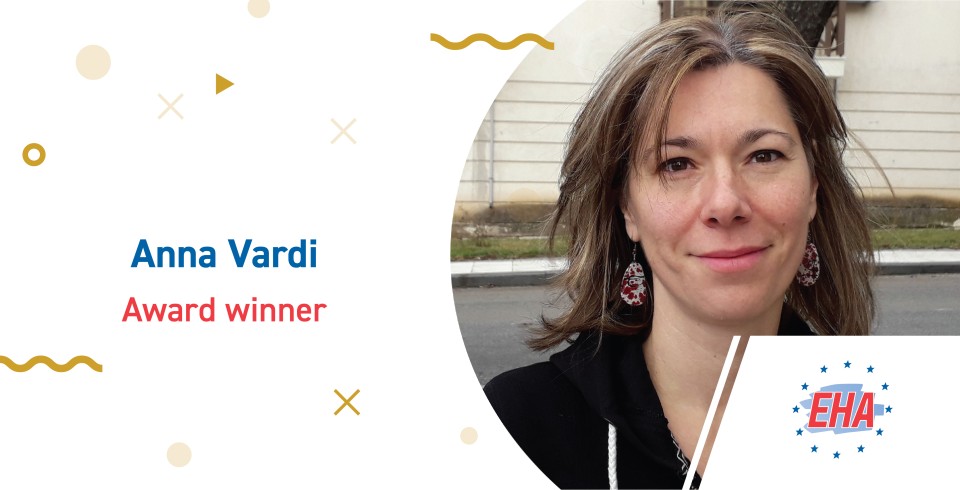This information originally appeared on the previous EHA website. Links to other pages may be inactive.

- Please tell us more about yourself (name, lab, short bio)
I am Anna Vardi. I am currently working as a Consultant Hematologist at the Hematology Department and HCT Unit, G. Papanikolaou Hospital, Thessaloniki, Greece, under the Directorship of Dr. Achilles Anagnostopoulos. I attend patients (60% of working time) and I also work in the Molecular Biology Laboratory of the Department (40% of working time). Moreover, I work as external collaborator with the Institute of Applied Biosciences, Center for Research and Technology Hellas (INAB|CERTH, Thessaloniki, Greece), with the group of my mentor, Kostas Stamatopoulos.
- What will winning the PSRG mean for your career?
I have a strong focus in chronic lymphocytic leukemia (CLL) and research experience on immunogenetics and immunoinformatics.The proposed project ideally bridges my clinical interests with my research career, set to investigate questions that rise through everyday clinical practice. To me, PSRG is an excellent opportunity to perform competitive, meaningful translational research and further evolve towards what its title is about, a Physician Scientist.
- How did you experience the application for this grant?
Putting down a project into a short, precise proposal inevitably puts you in the position to strictly review yourself, which is always helpful for realizing caveats and weaknesses, and finding ways to deal with them. The interview was an amazing experience, having leading experts on all hematology fields sit with you to discuss your idea of a project - it was stressful, but in the end I felt really priviledged.
I also have to say, I felt grateful for the warm support of the people I work with:
- my mentor, Kostas Stamatopoulos (who has always urged me to pursue a research career),
- my Director, Achilles Anagnostopoulos (who has continuously supported my research activities and actually granted 50% protected time from my clinical duties in a hematology department with particularly heavy clinical load),
- and all my clinical colleagues, who accept my dual role as a physician scientist and support me in every step.
- Do you have any tips for those who would like to apply for such a grant as well?
To insist, and pursue their ideas - and to perceive this as a valuable experience, no matter the outcome
- What research project will you pursue for the PSRG?
During my PhD research on CLL ontogenesis I have worked under the supervision of Dr. Kostas Stamatopoulos, Director of INAB|CERTH. Under his mentoring, I have recently published a high-throughput study of the TR repertoire in CLL which addressed several methodological challenges in order to ensure optimal experimental setup. The results suggest that CLL T cell clones may expand in response to tumor-related antigens, which could be common across (subsets of) patients. Based on these findings, I carried on to investigate the effect of various types of treatment on CLL T cells, and found that B cell receptor (BcR) signaling inhibitors retain such T cell clones and may actually abrogate their B-cell induced anergic state. Therefore, I am now genuinely intrigued to discover the respective conserved neoepitopes, having in mind that this information would be of high translational value, as it would open the possibility for a stratified treatment by means of engineered T cells or vaccination strategies.
- Can you tell us more about it?
We aim to identify targets of CLL cytotoxic T cells, especially neoepitopes that may be contained within the clonotypic B cell receptor immunoglobulin and thus may be conserved among stereotypic CLL. Subsequently, we seek to characterize the molecular characteristics of the respective T cell clones, with the ultimate goal to open the possibility for a stratified treatment by means of engineered T cells or by peptide vaccines targeting such conserved epitopes.
- What would you like to achieve with your research?
This is a relatively high-risk proposal, but should the hypothesis prove right, it would also be of high-gain, as it could directly translate into immunotherapeutic strategies for CLL.
- What will the world be like without your research?
Well, the world will continue to spin without me and my research. Science has evolved so much over the last decades, that most researchers now have to become dedicated to some sub-specialty just to be able to keep up with new knowledge. That said, I do believe that physicians are privileged in this respect, because no matter their subspecialty or focus, if they are able to pursue questions that rise during their clinical practice, this is bound to benefit their patients in the long run.